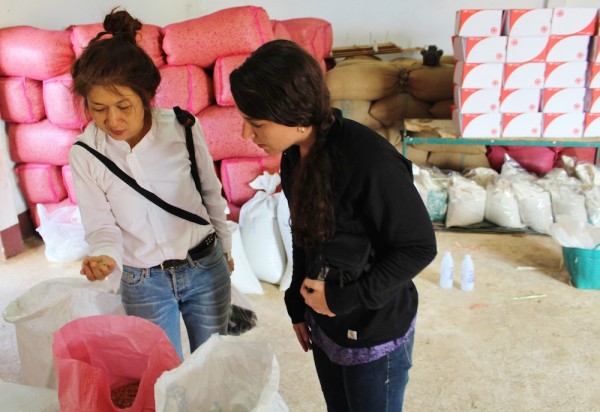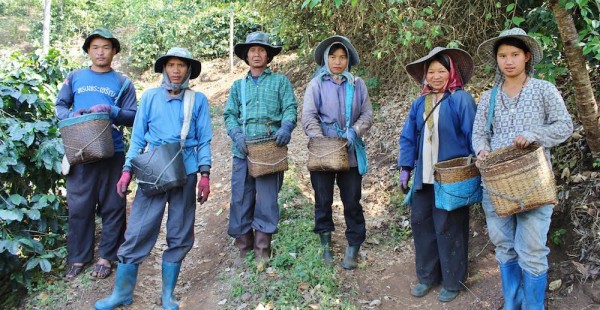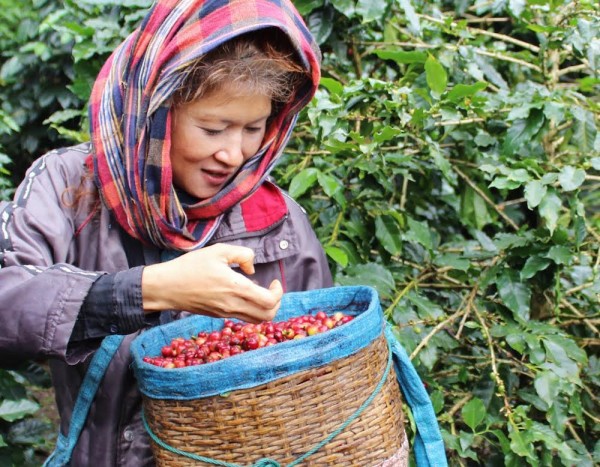
Doon (left) and Armstrong readying green coffee for shipment. All photos courtesy of Kao Jai Coffee.
With no coffee industry experience, Kyle Ducharme and Megan Armstrong set out from Nashville to teach English in Northern Thailand in October 2013. While lesson planning at a small coffee shop in the city of Chiang Rai, the pair was struck by the vibrancy of the coffee.
Within a month, they visited the local farm where the coffee was produced, and within a year, they launched Kao Jai Coffee, a full-on importing and roasting business with a transparency-driven supply model and big goals to help elevate Thai specialty coffee.
The first batch of roasted coffee was sold in July 2014, reflecting what Ducharme and Armstrong have termed a Farmer Satisfied Price, a beyond fair trade price they believe reflects the quality of the coffee and provides wages that they believe can support farmer partners throughout the year.
We recently caught up with Ducharme to discuss Kao Jai’s whirlwind first year, and what all goes into the launch of a highly transparent coffee import and roasting business.
When did the business launch in earnest?
After our first visit to the farm in November of 2013, we spent the next seven months working closely with the farmers and teaching ourselves everything necessary to run a full fledged direct-trade coffee company. It wasn’t until July 4th that we had the first batch of coffee roasted and packaged in Nashville.
How do the import wing and the roasting wing relate?
We directly purchase from six families in Thailand and are essentially responsible for every step of the process from Thailand to Nashville. Since we had no experience in coffee before, we wanted to partner with a local roaster that shared the same purpose as us. Also, at that point I was only six months out of college and roasters are a bit pricey. Our hopes are to continue with this model, then begin roasting ourselves in the future, so that more of sales from the coffee can go back to the farm.
Can you share how much of your revenue is roasted coffee sales and how much is green coffee sales?
Only about 15 to 20 percent of our sales is green coffee because we’re really focusing on building a brand around Kao Jai. We’re hoping to eventually partner with a larger coffee company so that we can exponentially increase our ability to help the farmers, because that’s why we got into this in the first place. The more we sell, whether green or roasted, the more families we can bring into the Kao Jai family and hopefully expand onto other mountains in the area to help even more people.
Who are you working with in Thailand?
Our main contact is Pongladda Srisaart, but everyone calls her Doon. She’s by far one of the most amazing and inspirational people I’ve ever met. She self-taught herself English for the sole purpose of being able to share Thai coffee with the western world so that the farmers could live a better life. She works specifically with six families from the Akha Hilltribe in Chiang Rai province of Thailand, but her hope is to continue to expand so that more families can be invited to join.
Luckily because of the internet we’re able to stay in close contact with the farmers, and I talk with Doon almost daily via Facebook or e-mail. Pretty much everything from the farm to Nashville to the roasters and stores is done by Doon, myself or my fiance. We’ve tried to structure it in a way that the path from drinker to farmer is the shortest and most transparent route, which is why we publicly share our costs and profit margin so people know exactly where their money goes.
What role, if any, is quality development playing in this relationship?
The farmers are definitely excited that they now have an option to partner with a company that cares more about quality and process than the quantity. The history of Thai coffee is fascinating — the King of Thailand introduced coffee plants in the 1970s to combat the growing of opium, but since recently Thai coffee hasn’t had the best reputation because most think they only produce robusta. They’re being forced to sell to middlemen and traders that care more about the bottom line.
Nick Brown
Nick Brown is the editor of Daily Coffee News by Roast Magazine.
Comment
2 Comments
Comments are closed.








Thanks Nick Brown for Give Us a Good Chance to tell our story to your Good Roast Magazine,It’s so meaning to us,Come with Kao Jai Coffee visit Our Beautiful Mountain and hill tribes coffee’s farmers, we r so proud to show you our processing of Arabica Coffee Beans “Small But Strong & Density “..
After reading this inspiring article, I had to buy some to roast at home. I look forward to tasting the coffee of Thailand as much as the great food.